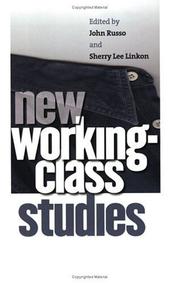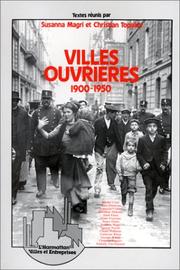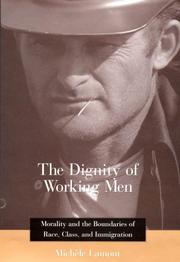| Listing 1 - 10 of 20 | << page >> |
Sort by
|
Book
ISBN: 9780141974996 Year: 2015 Publisher: London Penguin
Abstract | Keywords | Export | Availability | Bookmark
 Loading...
Loading...Choose an application
- Reference Manager
- EndNote
- RefWorks (Direct export to RefWorks)
Book
ISBN: 9185838047 Year: 1987 Publisher: Göteborg Göteborgs Universitet. Etnologiska institutionen
Abstract | Keywords | Export | Availability | Bookmark
 Loading...
Loading...Choose an application
- Reference Manager
- EndNote
- RefWorks (Direct export to RefWorks)
Book
ISBN: 906168515X Year: 1975 Publisher: Nijmegen Socialistische Uitgeverij
Abstract | Keywords | Export | Availability | Bookmark
 Loading...
Loading...Choose an application
- Reference Manager
- EndNote
- RefWorks (Direct export to RefWorks)
Social stratification --- World history --- Sociology of work --- Labour economics --- Arbeidersklasse --- Socialisme ; geschiedenis --- #gsdbS --- 316.343.63 --- Arbeidersstand. Proletariaat. Landarbeiders --(sociale stratificatie) --- 316.343.63 Arbeidersstand. Proletariaat. Landarbeiders --(sociale stratificatie)
Book
ISBN: 2870900546 9782870900543 Year: 2006 Volume: 115 Publisher: Bruxelles Contradictions
Abstract | Keywords | Export | Availability | Bookmark
 Loading...
Loading...Choose an application
- Reference Manager
- EndNote
- RefWorks (Direct export to RefWorks)
#SBIB:316.334.2A560 --- BPB0610 --- 316.343.63 --- 331.892 --- #SBIB:316.334.2A561 --- 316.343.63 Arbeidersstand. Proletariaat. Landarbeiders --(sociale stratificatie) --- Arbeidersstand. Proletariaat. Landarbeiders --(sociale stratificatie) --- Partijen en strategieën in de onderneming: industrieel conflict: algemeen --- stakingen - bedrijfsbezettingen - fabrieksbezettingen (zie ook 323.25) --- Partijen en strategieën in de onderneming: staking en lock-out --- Sociology of work --- Belgium
Book
ISBN: 9781472418500 9781315584348 9781317129295 9781317129301 9781138546622 Year: 2014 Publisher: Farnham Ashgate
Abstract | Keywords | Export | Availability | Bookmark
 Loading...
Loading...Choose an application
- Reference Manager
- EndNote
- RefWorks (Direct export to RefWorks)
Focusing on the working-class experience of gentrification, this book re-examines the enduring relationship between class and the urban. Class is so clearly articulated in the urban, from the housing crisis to the London Riots to the evocation of housing estates as the emblem of 'Broken Britain'. Gentrification is often presented to a moral and market antidote to such urban ills: deeply institutionalised as regeneration and targeted at areas which have suffered from disinvestment or are defined by 'lack'. Gentrification is no longer a peripheral neighbourhood process: it is policy; it is widespread; it is everyday. Yet comparative to this depth and breadth, we know little about what it is like to live with gentrification at the everyday level. Sociological studies have focused on lifestyles of the middle classes and the working-class experience is either omitted or they are assumed to be victims. Hitherto, this is all that has been offered. This book engages with these issues and reconnects class and the urban through an ethnographically detailed analysis of a neighbourhood undergoing gentrification which historicises class formation, critiques policy processes and offers a new sociological insight into gentrification from the perspective of working-class residents. This ethnography of everyday working-class neighbourhood life in the UK serves to challenge denigrated depictions which are used to justify the use of gentrification-based restructuring. By exploring the relationship between urban processes and working-class communities via gentrification, it reveals the 'hidden rewards' as well as the 'hidden injuries' of class in post-industrial neighbourhoods. In doing so, it provides a comprehensive 'sociology of gentrification', revealing not only how gentrification leads to the displacement of the working class in physical terms but how it is actively used within urban policy to culturally displace the working-class subject and traditional ways of life in an attempt to create the neoliberal subject. It reveals the novel forms of displacement this causes and develops an original typology of displacement from this. The book also demonstrates that gentrification is not always a zero-sum game for working-class residents, who at times rework gentrification processes, on their own terms for their own gains.
Social classes --- Gentrification --- Working class --- Neighborhoods --- Group identity --- Classes sociales --- Embourgeoisement (Urbanisme) --- Travailleurs --- Quartiers (Urbanisme) --- Identité collective --- #SBIB:316.334.5U13 --- 316.343.63 --- Sociologie van stad en platteland: sociale aspecten van de ruimte, sociale ecologie --- Arbeidersstand. Proletariaat. Landarbeiders --(sociale stratificatie) --- 316.343.63 Arbeidersstand. Proletariaat. Landarbeiders --(sociale stratificatie) --- Identité collective

ISBN: 0801489679 0801442524 Year: 2005 Publisher: Ithaca ILR Press
Abstract | Keywords | Export | Availability | Bookmark
 Loading...
Loading...Choose an application
- Reference Manager
- EndNote
- RefWorks (Direct export to RefWorks)
Working class --- Travailleurs --- Research --- Study and teaching --- History --- Recherche --- Etude et enseignement --- Histoire --- 316.343.63 --- #SBIB:316.334.2A70 --- Arbeidersstand. Proletariaat. Landarbeiders --(sociale stratificatie) --- Beroepensociologie: algemeen, middenstand, vrije beroepen --- 316.343.63 Arbeidersstand. Proletariaat. Landarbeiders --(sociale stratificatie) --- Commons (Social order) --- Labor and laboring classes --- Laboring class --- Labouring class --- Working classes --- Social classes --- Labor --- Employment


ISBN: 2738405630 9782738405630 Year: 1990 Publisher: Paris Harmattan
Abstract | Keywords | Export | Availability | Bookmark
 Loading...
Loading...Choose an application
- Reference Manager
- EndNote
- RefWorks (Direct export to RefWorks)
Working class --- History. --- 316.343.63 --- 911.375 --- Arbeidersstand. Proletariaat. Landarbeiders --(sociale stratificatie) --- Steden. Studie van stedelijke vestiging. Geografie van steden. Stadsgeografie --- 316.343.63 Arbeidersstand. Proletariaat. Landarbeiders --(sociale stratificatie) --- Tenement houses --- History --- Neighborhoods --- Travailleurs --- Quartiers (Urbanisme) --- Housing --- Social aspects --- Habitations --- Logement --- Histoire --- Aspect social --- Working class - France - History.

ISBN: 0674003063 0674009924 9780674009929 Year: 2000 Publisher: New York, N.Y. Russell Sage Foundation
Abstract | Keywords | Export | Availability | Bookmark
 Loading...
Loading...Choose an application
- Reference Manager
- EndNote
- RefWorks (Direct export to RefWorks)
Michele Lamont takes us into the world inhabited by working-class men - the world as they understand it. Interviewing black and white working-class men who, because they are not college graduates, have limited access to high-paying jobs and other social benefits, she constructs a revealing portrait of how they see themselves and the rest of society. Morality is at the centre of these workers' worlds. They find their identity and self-worth in their ability to discipline themselves and conduct responsible but caring lives. These moral standards function as an alternative to economic definitions of success, offering them a way to maintain dignity in an out-of-reach American dreamland. But these standards also enable them to draw class boundaries toward the poor and, to a lesser extent, the upper half. Workers also draw rigid racial boundaries, with white workers placing emphasis on the "disciplined self" and blacks on the "caring self". Whites thereby often construe blacks as morally inferior because they are lazy, while blacks depict whites as domineering, uncaring and overly disciplined. This book also opens up a wider perspective by examining American workers in comparison with French workers, who take the poor as "part of us" and are far less critical of blacks than they are of upper-middle-class people and immigrants. By singling out different "moral offenders" in the two societies, workers reveal contrasting definitions of "cultural membership" that help us understand and challenge the forms of inequality found in both societies.
Blue collar workers --- Men --- Work ethic --- Working class --- Employment --- #SBIB:316.334.2A340 --- 316.343.63 --- 316.343.63 Arbeidersstand. Proletariaat. Landarbeiders --(sociale stratificatie) --- Arbeidersstand. Proletariaat. Landarbeiders --(sociale stratificatie) --- Arbeidssociologie: ongelijkheden op de arbeidsmarkt: algemeen --- Ethic, Work --- Ethics --- Human males --- Human beings --- Males --- Effeminacy --- Masculinity --- Laborers --- Manual workers --- Employees --- Social stratification --- Social problems
Book
ISBN: 9781848548824 1848548826 Year: 2015 Publisher: London John Murray
Abstract | Keywords | Export | Availability | Bookmark
 Loading...
Loading...Choose an application
- Reference Manager
- EndNote
- RefWorks (Direct export to RefWorks)
'There was nothing extraordinary about my childhood or background. And yet I looked in vain for any aspect of my family's story when I went to university to read history, and continued to search fruitlessly for it throughout the next decade. Eventually I realised I would have to write this history myself.' What was it really like to live through the twentieth century? In 1910 three-quarters of the population were working class, but their story has been ignored until now. Based on the first-person accounts of servants, factory workers, miners and housewives, award-winning historian Selina Todd reveals an unexpected Britain where cinema audiences shook their fists at footage of Winston Churchill, communities supported strikers, and where pools winners (like Viv Nicholson) refused to become respectable. Charting the rise of the working class, through two world wars to their fall in Thatcher's Britain and today, Todd tells their story for the first time, in their own words. Uncovering a huge hidden swathe of Britain's past, The People is the vivid history of a revolutionary century and the people who really made Britain great.
Working class --- History --- Great Britain --- Social conditions --- Civilization --- 316.343.63 --- 316.344.24 --- 316.344.24 Beroepsstratificatie. Professionalisering. Beroepsprestige. Beroepsstatus. Professie --- Beroepsstratificatie. Professionalisering. Beroepsprestige. Beroepsstatus. Professie --- 316.343.63 Arbeidersstand. Proletariaat. Landarbeiders --(sociale stratificatie) --- Arbeidersstand. Proletariaat. Landarbeiders --(sociale stratificatie) --- Civilization. --- Social conditions. --- Travailleurs --- Working class. --- 1900-1999. --- Grande-Bretagne --- Great Britain. --- Civilisation --- Conditions sociales

ISBN: 0394719409 Year: 1973 Publisher: New York [N.Y.] Vintage
Abstract | Keywords | Export | Availability | Bookmark
 Loading...
Loading...Choose an application
- Reference Manager
- EndNote
- RefWorks (Direct export to RefWorks)
Social stratification --- Working class --- Social classes --- Social conflict. --- Travailleurs --- Classes sociales --- Conflits sociaux --- 316.343.63 --- -Social conflict --- -316.342.2 --- Commons (Social order) --- Labor and laboring classes --- Laboring class --- Labouring class --- Working classes --- Labor --- Class conflict --- Class struggle --- Conflict, Social --- Social tensions --- Interpersonal conflict --- Social psychology --- Sociology --- Class distinction --- Classes, Social --- Rank --- Caste --- Estates (Social orders) --- Social status --- Class consciousness --- Classism --- Arbeidersstand. Proletariaat. Landarbeiders --(sociale stratificatie) --- Employment --- 316.343.63 Arbeidersstand. Proletariaat. Landarbeiders --(sociale stratificatie) --- Social conflict --- 316.342.2 --- CDL --- 316
| Listing 1 - 10 of 20 | << page >> |
Sort by
|

 Search
Search Feedback
Feedback About UniCat
About UniCat  Help
Help News
News